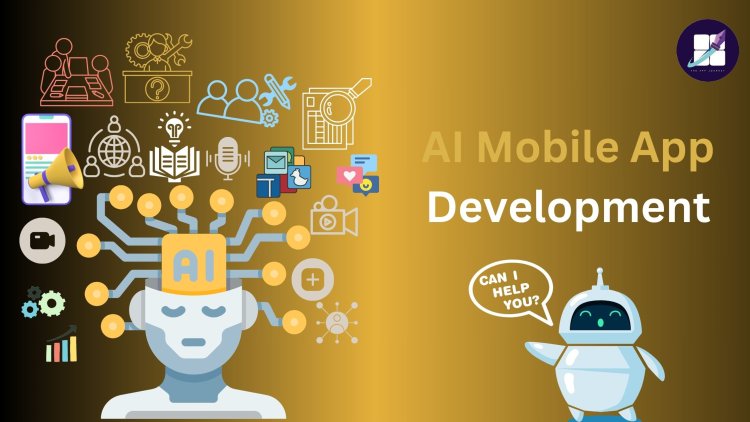How AI can Change the Future of Mobile App Development?
Are you find the AI in mobile app development? Then you've come to the right place - The App Journey! We offer a range of services for your benefit and explore future trends in AI-driven mobile apps. Visit now.
Share this Post to earn Money ( Upto ₹100 per 1000 Views )

Introduction
Artificial Intelligence (AI) is reshaping various industries, and mobile app development is no exception. As AI continues to evolve, it brings forth innovative solutions that are transforming the way mobile apps are developed, deployed, and used. From enhancing user experience to automating development processes, AI is set to redefine the future of mobile app development.
AI-Powered Personalization
One of the most significant contributions of Artificial Intelligence in Mobile App Development is personalization. AI algorithms analyze user behavior, preferences, and patterns to deliver personalized content and recommendations. This level of customization enhances user engagement and satisfaction, leading to higher retention rates. For example, streaming services like Netflix and Spotify use AI to suggest movies, shows, and music based on individual user preferences.
Enhanced User Experience with AI Chatbots
AI-driven chatbots are becoming integral to mobile apps, offering 24/7 customer support and seamless interaction. These chatbots use Natural Language Processing (NLP) to understand and respond to user queries in a human-like manner. They can handle a variety of tasks, from answering frequently asked questions to processing transactions, thereby improving the overall user experience. Apps like Facebook Messenger and Slack utilize AI chatbots to enhance user interaction and engagement.
Automated and Efficient Development Processes
AI is streamlining the mobile app development process through automation. AI-powered tools can write code, debug, and test applications, significantly reducing development time and human error. For instance, automated testing tools can simulate thousands of test cases, ensuring the app functions flawlessly under different scenarios. This not only accelerates the development cycle but also ensures a higher quality product.
Predictive Analytics for Better Decision-Making
Predictive analytics, driven by AI, enables developers to make informed decisions based on data insights. By analyzing user data, AI can predict trends, identify potential issues, and suggest improvements. This proactive approach allows developers to enhance app performance and user satisfaction continuously. Companies like Amazon and Google leverage predictive analytics to optimize their apps, offering a more intuitive user experience.
Advanced Security Features
Security is a paramount concern in mobile app development. AI enhances security measures by identifying and mitigating potential threats in real-time. Machine learning algorithms can detect unusual activity, recognize patterns of malicious behavior, and respond to security breaches swiftly. For instance, AI-powered fraud detection systems in banking apps can identify suspicious transactions and alert users immediately, ensuring their financial data remains secure.
Voice and Image Recognition Capabilities
AI is driving advancements in voice and image recognition technologies, making mobile apps more interactive and accessible. Voice recognition, powered by AI, enables users to interact with apps through voice commands, enhancing usability for individuals with disabilities. Image recognition technology allows apps to identify objects, faces, and scenes, enabling features like augmented reality (AR) and facial recognition. Apps like Google Photos and Snapchat utilize these AI capabilities to offer unique and engaging experiences.
AI in Healthcare Apps
The healthcare sector is witnessing a significant transformation with AI-powered mobile apps. These apps can diagnose conditions, provide personalized treatment plans, and offer virtual health consultations. AI algorithms analyze medical data, predict health trends, and offer insights that help in early detection and prevention of diseases. Apps like Ada and Babylon Health are revolutionizing healthcare by making medical advice and services more accessible to users worldwide.
Future Trends in AI-Driven Mobile App Development
The future of mobile app development is poised to be even more exciting with AI-driven innovations. Here are some trends to watch out for:
-
AI-Enhanced Augmented Reality (AR) and Virtual Reality (VR): AI will further enhance AR and VR applications, providing more immersive and realistic experiences. This can revolutionize gaming, education, and remote work.
-
Edge AI: Processing data closer to the source (on-device) rather than relying on cloud servers will improve response times and data privacy. This will be particularly beneficial for applications requiring real-time processing, such as autonomous vehicles and IoT devices.
-
Emotional AI: Future AI systems will be capable of recognizing and responding to human emotions, leading to more empathetic and personalized user interactions. This can transform customer service, mental health apps, and social media platforms.
-
AI-Driven App Marketing: AI will play a crucial role in app marketing by analyzing user data to create targeted marketing campaigns. This will help in acquiring and retaining users more effectively.
Conclusion
AI is undeniably transforming the future of mobile app development. From enhancing personalization and user experience to automating development processes and improving security, AI is at the forefront of innovation. As AI technology continues to advance, we can expect even more groundbreaking developments that will shape the way we interact with mobile apps. Embracing AI in mobile app development is not just an option but a necessity for staying competitive in the ever-evolving digital landscape.















